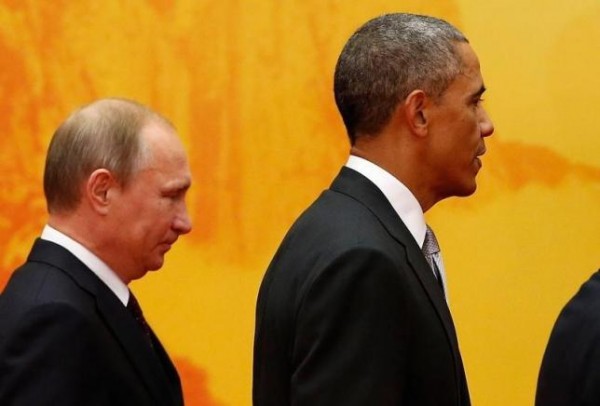
For a man often portrayed in the West as the swaggering bully leader of a renegade state, in need of containment and isolation, President Vladimir V. Putin has spent the last few days asserting himself at the center of international diplomacy — even receiving surprising credit from President Obama for his help in securing Tuesday’s landmark accord to contain Iran’s nuclear program.
Although the prolonged negotiations over Iran involved multiple nations, including Russia, the final push to complete the accord largely came down to the United States and Iran, with Mr. Putin’s envoys serving as “secondary players,” as one analyst, Steven Pifer of the Brookings Institution, put it.
Nonetheless, the Russians intervened earnestly in the last weeks in hopes of lifting the arms embargo imposed on Iran in 2010, no doubt looking forward to a boom in new contracts that could boost an ailing Russian economy. The demand had not been a focus of the talks in the final push, but with China’s support, Russia’s gambit succeeded in forcing a compromise that would lift the embargo after five to eight years and could allow some authorized sales sooner.
The agreement underscored Mr. Putin’s ability to wield influence on the world stage despite Western efforts to ostracize him.
Mr. Putin’s diplomatic isolation, though pronounced in Europe and the United States, has never been complete. Last week, he basked in the praise of world leaders, including Presidents Xi Jinping of China and Hassan Rouhani of Iran, who had gathered in the Russian city of Ufa for meetings of three economic groupings with Russia at the core: the Shanghai Cooperation Organization, the Eurasian Economic Union, and the BRICS group of rising economic powers: Brazil, Russia, India, China and South Africa.
More remarkable was the credit from President Obama, who said Tuesday that Mr. Putin was instrumental in securing the accord on Iran’s nuclear program. “Putin and the Russian government compartmentalized on this in a way that surprised me, and we would have not achieved this agreement had it not been for Russia’s willingness to stick with us,” Mr. Obama said.
Mr. Obama also noted that Mr. Putin called him recently to discuss the situation in Syria and suggested further cooperation could be possible, despite the ongoing disagreement over Ukraine. Mr. Obama followed up those remarks with a telephone call to Mr. Putin on Wednesday that, the Kremlin said, emphasized the “role of the Russian-American dialogue in ensuring security and stability in the world.”
Whether any cooperation over Syria is possible remains to be seen. Mr. Obama and his aides, including Secretary of State John Kerry, have said repeatedly that the United States would continue to work with Russia on areas of mutual interest, like Iran and Syria, even as the overall relationship descends into mutual recriminations and increasingly hostile exchanges over Ukraine. The Iran accord would seem to validate their approach, though Mr. Putin has hardly returned to the fold.
On the question of Ukraine, and especially Russia’s annexation of Crimea, he is not the least apologetic, and in public remarks he has continued to blame the West and the Ukrainian government for the crisis there. At the same time, analysts say, Mr. Putin has adeptly kept himself on the world stage, making calculated diplomatic decisions that are undermining efforts in the West to cast him as a villain.
Some analysts questioned why Russia would be so eager to help bring about the nuclear accord, as the return of Iran to the world oil market could further depress prices and hurt the Russia economy, which is heavily dependent on petroleum sales and already in recession.
“Russia has been rather ambivalent about striking the deal, not because it is worried about the Iranian nuclear program, but because it is worried about the Iranian oil,” said Pavel K. Baev, a researcher at the Peace Research Institute in Oslo.
Mr. Baev noted that at several crucial points in the long negotiations, Russia had seemed to be working to complicate things. In November, for example, it announced a new deal to build nuclear reactors in Iran, and in April said it was resuming the sale of S-300 surface-to-air missiles that Iran had ordered before a 2010 arms embargo was authorized by the United Nations Security Council.
“In the crucial final stage of negotiations, however, Moscow refrained from any spoiling,” Mr. Baev said, adding that “the real influence behind this self-restraint, in my opinion, is China, which wanted the deal concluded and impressed upon Russia the undesirability of any sabotage.”
If indeed Mr. Putin was acting in concord with China’s wishes, it would only underscore the extent to which he has turned to Asia after the breakdown in relations with the West over Ukraine. Indeed, part of Mr. Putin’s calculation may be that improved economic ties with China, including increased oil and gas sales, will do far more good for Russia than Iran’s return to the energy market will do harm.
There are other considerations: Mr. Putin’s image at home, for instance, where portrayals of him on state-controlled television as a master statesmen have been buoyed in recent days by images of him meeting with the leaders of China, India, Brazil, South Africa and Iran.
And, of course, there is the imperative to answer the West’s characterization of him as an international outlaw, by putting himself forward as a force for peace by publicly pressing for the Iranian nuclear deal.
“This is an example of strategic, reasonable behavior of Russia,” Aleksandr A. Dynkin, the director of the Institute of World Economy and International Relations of the Russian Academy of Science, told Vedomosti.
The New York Times

Leave a Reply
You must be logged in to post a comment.